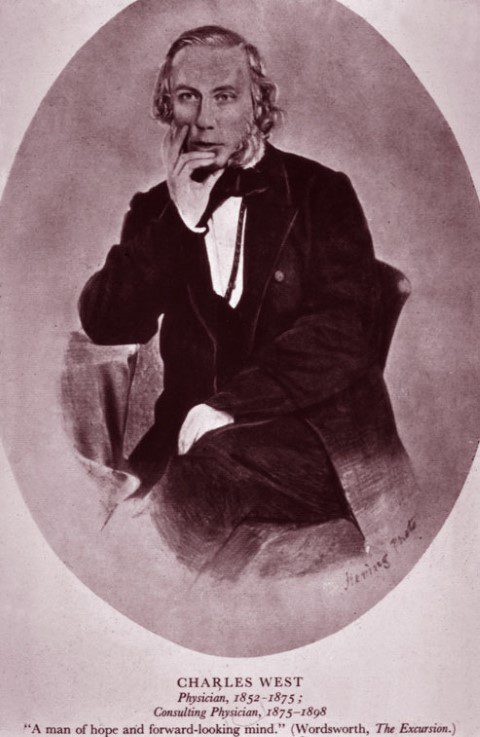Paula Hellal
London, United Kingdom

Despite the worldwide renown of Britain’s first specialist pediatric hospital, remarkably little has been written about its founder. Charles West was born on August 8, 1816, the second son of a London businessman who later became a Baptist lay preacher. When West was 15, he was apprenticed to an apothecary and general practitioner in Amersham. Unable to study medicine at Oxford because of his Baptist parentage, he went to St Bartholomew’s, one of London’s oldest hospitals, where he won prizes for medicine, forensic medicine, and midwifery. He continued his medical training at Bonn University and then studied in Paris before obtaining his doctorate in Berlin in 1837. He gained further expertise in midwifery by spending a short period of time working at Dublin’s Meath hospital.
West spent the early 1840s as physician to the Universal Dispensary for women and children in Waterloo Road, London, the only outpatient service for children in the city in the early to mid-nineteenth century. He was also appointed physician accoucheur at the Middlesex Hospital, where in 1847 he gave a course of lectures on children’s diseases that were published the following year as Diseases of Infancy and Childhood. This work was the first English textbook on pediatrics produced in the 19th century: “Of the 6,000 works on pediatrics published between the mid-eighteenth and mid-nineteenth centuries almost none were written in English.”1 West’s work was based on his observations of 14,000 children with 600 detailed cases and 180 post mortems. Expanded in 1854, it went into seven editions and numerous translations and made West’s name among his fellow physicians. A contemporary reviewer of the book describes “a reflective, judicious and cautious writer, thoroughly versed in the department of practical medicine which he discusses and teaches.”2
While working at the Universal Dispensary, West tried, and failed, to persuade its management to establish a specialist hospital with in-patient beds for sick children. With his colleague Dr Henry Bence-Jones he formed in 1850 a committee with the aim of establishing such an institution, supported by eminent philanthropists and public health reformers such as Lord Shaftesbury, Baroness Burdett-Coutts, and Edwin Chadwick. On March the 19th1851 at a public meeting at which Lord Shaftesbury was chairman the hospital was founded, but it took a further eleven months before it opened its doors. West hoped the establishment of the children’s hospital would “henceforth afford to the profession a field for the minute and accurate observation of the diseases of early life, such as neither dispensary nor private practice can offer even to those most earnest in the cultivation of medical knowledge”.3
The newly acquired knowledge was disseminated to the medical profession by lectures open to medical practitioners and their students, held in the hospital from November 1859.
West believed it incumbent not to treat the sick child as if he were “a miniature man, feebler in intellect, as he is smaller in strength, but differing in degree only, not in kind.”4 He wrote extensively on the importance of specialist treatment for children at a time when much of the medical establishment, including some of his own colleagues at Great Ormond Street, argued against the need for pediatric hospitals.
West wrote the early hospital reports and was the hospital’s senior physician for twenty-three years, then consulting physician. However, in 1877, following personal and policy differences with the Board of Management, he resigned all connection with the hospital and spent the remaining twenty years of his life in relative obscurity practicing medicine in Nice, London, and Paris – where he died in 1898 aged 82.
As well as writing on childhood diseases, West published Lectures on Diseases of Women, manuals for mothers on how to care for the sick child, and books on hospital design and the training of nurses. In 1878, the hospital offered formal training that evolved into the Charles West School of Nursing.
West’s talents “involved clinical acumen, unusual sensitivity, and knowledge of how to deal with children.”5 He promoted kindness, tact, rest, and amusement when dealing with his little patients: “The two bottom drawers of his consulting room table were a treasure-house of marvelous toys, which assisted him to make his examination accurate and thorough.”6 West’s dedication, his careful clinical observation, and his ability to keep abreast of medical research taking place abroad as well as at home (West was fluent in six languages) made him Britain’s first pediatrician and the leading expert of his day able to advise his colleagues on all aspects of the medical care and treatment of children.
References
- Angel Ballabriga, “One century of pediatrics in Europe”, in B. L. Nichols, A. Ballabriga, & N. Kretchmer (Eds.), History of Pediatrics 1850–1950. New York: Ravens Press. 1991.
- Anon, Review of 4th edition of “Lectures on the Diseases of Infancy and Childhood”. Edinburgh Medical Journal, 1860, Vol 5, 849-859, pg 850.
- Charles West, “Lectures of the Diseases of Infancy and Childhood” London. 3rd ed. 1854, preface.
- Charles West, “On some Disorders of the Nervous System in Childhood”, London. Longmans, Green and Co, 1871, 91-134, pg 116.
- Elizabeth Lomax, “Small and Special: The Development of Hospitals for Children in Victorian Britain” Wellcome Institute for the History of Medicine. Medical History. Supplement, 1996. No. 16, pg 159.
- Anon. “Obituary: Charles West”, The Lancet, 1898, Vol 1, 968-970, pg 969.
PAULA HELLAL, PhD, is an Honorary Research Fellow at Birkbeck, London University in the department of Linguistics. Her research interests include the history of the medical assessment and treatment of children with language disorders in 19th and early 20thcentury Britain. Her PhD thesis is based on case reports from the archives of Great Ormond Street Children’s Hospital.
Highlighted in Frontispiece Spring 2017 – Volume 8, Issue 4

Leave a Reply